Small but Mighty
Small but Mighty: SUNY-ESF athletics excel
SUNY-ESF athletics may seem tiny compared to their neighbors at Syracuse University, but the Mighty Oaks exceed expectations.
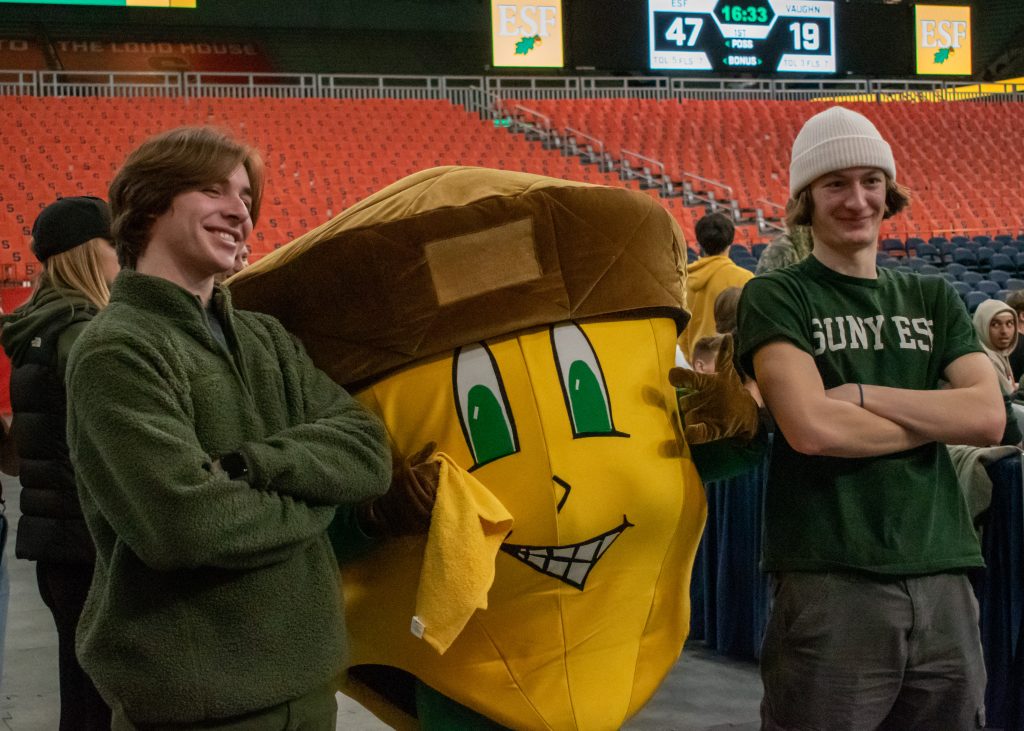
As Scott Blair looked out of Sadler Hall, he remarked on the scenery to another coach working at a Syracuse University summer basketball camp in 2004.
“Wow, this is a really amazing campus,” Blair, then an assistant coach at Kutztown University, said in observing SU’s campus.
Blair would later find out that he was marveling at the campus of SU’s neighbor, the SUNY College of Environmental Science and Forestry. Tucked away behind the massive JMA Wireless Dome and Barnes Center lies the entrance to the SUNY ESF campus, serving as a portal from a world of orange to a world of green.
Adjacent to the SU campus, ESF is nonetheless miles from its Division I neighbors in terms of size and vibe.
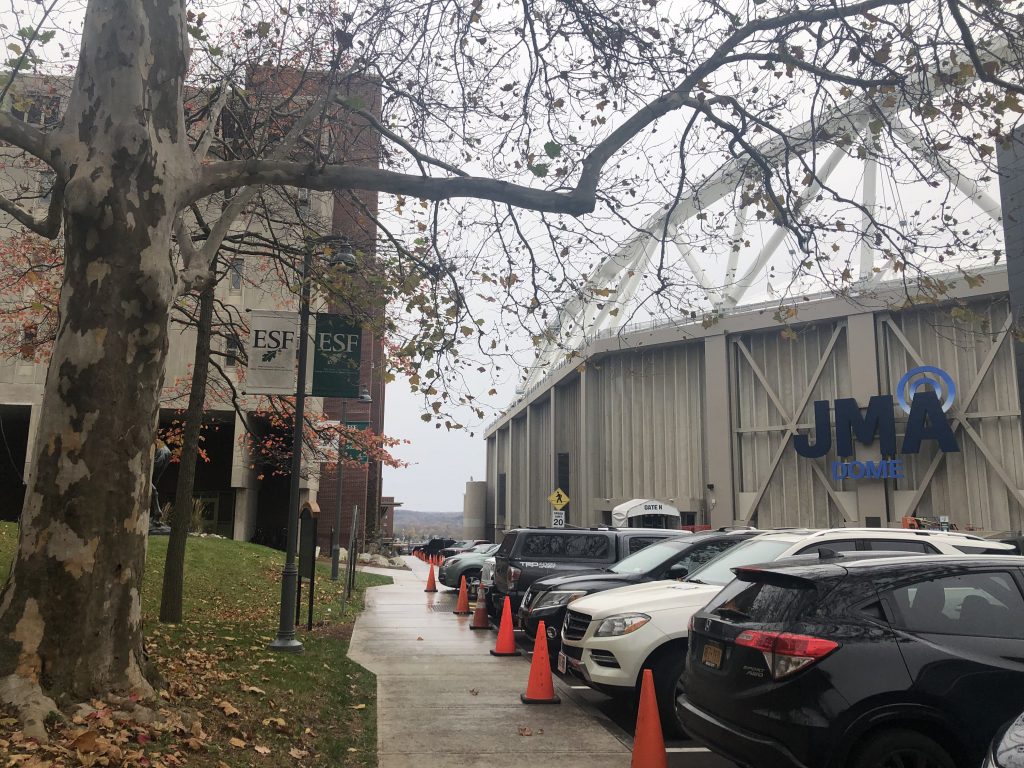
Blair, who coached the ESF men’s basketball team from 2010 to 2018, chuckled at the memory of confusing the campuses at the ESF 2023 Hall of Fame event in September, the school’s fifth-ever induction ceremony. Honorees included recent athletes from 2018 and 2019, John Dean from the class of 1959, and two entire cross-country teams.
ESF and SU sports have been intertwined ever since ESF was founded in 1911. The two schools have had an athletics relationship throughout their time as neighbors, including an ESF faculty member founding a Division I team over a century ago.
“SU lacrosse evolved from an ESF faculty member, named Laurie Cox, starting a team,” Kevin Reynolds, assistant coach and 2023 hall-of-fame inductee said. “The mixed ESF and SU player team traveled to Europe and won the championship in 1923.”
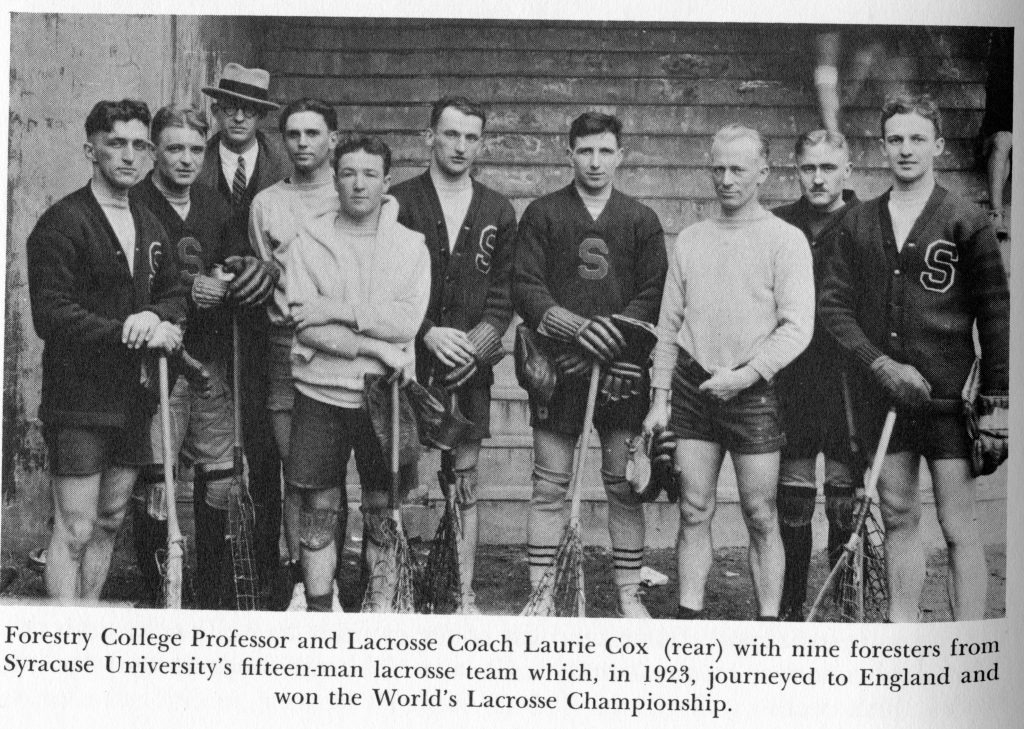
The last ESF athlete to play for the SU lacrosse team was Tom Nelson in 1989 after the NCAA deemed it illegal for Division I schools to have players from other schools on their roster.
Despite ESF sports’ long history, it wasn’t until 2010, when men’s soccer became the first ESF-exclusive team to play at an intercollegiate level, that the school began molding its own sports program. Due to the NCAA’s rule change in the late ‘80s, ESF athletes had to represent their own school in the USCAA (United States College Athletic Association) instead of SU in the NCAA.
ESF now has 12 intercollegiate-level teams, while Syracuse has 18. After over a decade of building up the program, the school has a men’s basketball and golf team, along with a men’s and women’s soccer, cross-country, track, bass fishing and timber sports teams. Despite being a new program to the intercollegiate sports scene, ESF has accomplished a lot in little time, exceeding outside expectations.
“We have competed in national championships, we’ve won national championships as teams and won national championships as individuals,” Dan Ramin, ESF athletic director since 2009, said in a video played during this year’s Hall of Fame ceremony. “We’ve got a timber sports team that is arguably one of the best in the northeast and has been for decades, bass fishing teams that competed in the national championship, and many of our teams continue to improve.”
The men’s and women’s cross-country teams have been especially successful. Entering this season, both teams were looking to win their third straight national championship, led by 2023 ESF Hall of Fame inductee Mike Melfi.
“If we can pull it off this year, we will be the only team in USCAA history to win three years in a row, men and women, same school,” said Melfi, who is entering his eighth year of coaching at ESF. On Nov. 12, both teams pulled off the feat, each winning their third straight USCAA national championship.
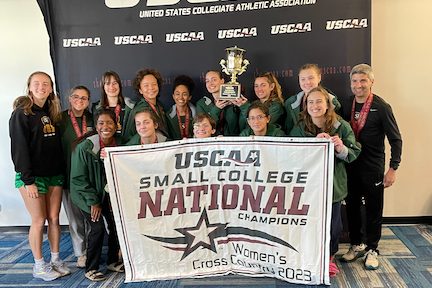
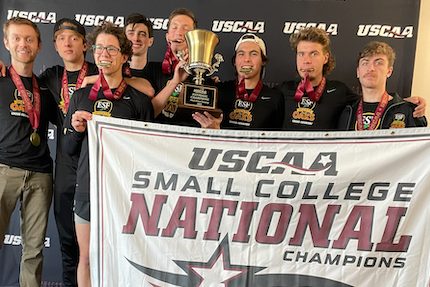
While ESF has the accolades to showcase its program, the school isn’t always on an even playing field. Unlike most teams ESF faces, all coaches are part-time. “Even though they’re part-time coaches, they still recruit, because they want to be competitive,” Ramin said.
Melfi has firsthand experience as a part-time head coach for the men’s and women’s cross country and track teams. “I’m doing a part-time job full time,” Melfi said. “Almost every team we run against has one or two full-time coaches.”
ESF also does not have its own proper facilities for sports teams, making use of other schools’ facilities. This is where ESF has used their SU neighbors to their advantage. As athletic director, Ramin has worked to establish a rapport with SU, giving them access to Division I facilities that other USCAA schools don’t have.
“Without the help of SU Athletics, we would fail to exist,” Ramin said. “We rent facilities and use facilities, and we work with each other, and if I didn’t have that relationship with them, I don’t know what we would do, we would be in trouble.”
ESF sports also lack a few things its school spirit can’t make up for. “We don’t even have an ice machine,” Melfi said. “If you’d like to ice something or something’s tweaked, it’s a hassle to get ice in.” Something like an ice machine is easy to take for granted at a well-known sports school, but a smaller university like ESF sometimes has to find alternatives.
Just as with all other challenges, ESF has been able to twist it into a positive for the program, using these obstacles to take away valuable life lessons for their student-athletes.
“We just find a way, that’s our saying, find a way, we figure it out,” Melfi said. “That’s going to make them really good employees someday, good people in the community. They won’t sit there and make excuses. They learned that through athletics.”
While student-athletes learn valuable lessons through athletics, learning in the classroom still takes priority, Ramin says. Given ESF’s science-focused curriculum, scheduling is a significant issue, as science labs are held at night.
“Our men’s soccer team trains Monday, Wednesday, Friday; the women’s team trains Tuesday, Thursday, Friday, and we kind of helped make the schedules where they take evening labs or late classes into the night,” Ramin said. “Ninety percent of our basic schedule is on the weekends because we can’t on Monday night go play somewhere.”
With a program best described as resilient, Dan Ramin has goals for more in the future.
“It is a goal to be in the NCAA before I leave,” Ramin said.
